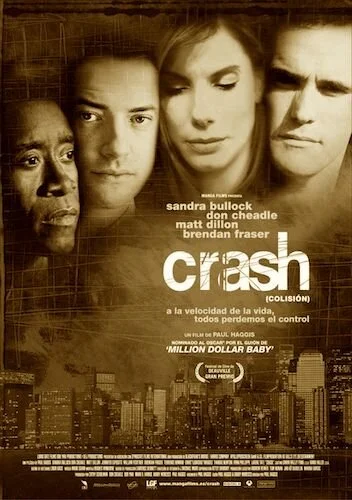Crash
This review is a part of the Best Picture Project: a review of every single Academy Award winner for the Best Picture category. Crash is the seventy eighth Best Picture winner at the 2005 Academy Awards.
As a means of avoiding giving Brokeback Mountain Best Picture, the Academy Awards went with the (somehow) safest answer by awarding Crash the top prize. It is strange how much of a discussion Crash is willing to have, and yet how many corners are cut, how passive each argument is, or how little we get out of these moments. Every storyline has a strength and a weakness, and sometimes they can be found within the same scene. It’s as if Paul Haggis — still high off his Million Dollar Baby run — was driven by the film’s one quote (about crashing into each other) more than actual story telling. These are vignettes spliced into one another. I want to like it more than I do. I just don’t, though.
On the bright side, an indie film (around the time the word “indie” was beyond changed from its original intentions) made a bigger splash than some of the most discussed films of 2005 (and, to a degree, 2004, when Crash was making its festival rounds). It paved the way for future sleeper hit Best Picture winners (mainly Slumdog Millionaire and The Hurt Locker). I appreciate all of this, but the film just never really affects me. I see great intentions, and misguided executions. A racist, sexist cop has a change of heart during a crisis? What normal person — disgusting or not — wouldn’t vow to save someone during a fatal calamity? I know the purpose of a scene like this is meant to show the trust a survivor of sexual harassment is supposed to have when being saved by the perpetrator, but even putting it that way makes me feel like something is a bit off. Every scene is like this. Changes of heart are nice, but how effective are they if we only get these snippets that try to say much more than they can?
The scene that continues to be used as the focal point of Crash, including critics like me.
Whenever I bring up Crash, I feel hesitant to say this, but… well, here goes. Daniel Ruiz’s daughter should have been killed in the climactic scene. As terrible as that is to type, hear me out (or read me out). Crash is trying to insist that there is never a right way to combat hatred and crime in the real world. Here, a father tells his daughter that a special invincibility cloak will protect her always. As she tries to save her father, the film goes into a huge, moving moment where a father believes his daughter is dead, when he was meant to be her protector forever. Then, psych, we learn that she wasn’t shot, and we all go home relieved. I understand how nice getting a free pass is, but a film trying to deliver hard hitting messages should not be getting by on free passes. On a surface level, Crash says a thousand statements and they work. Dig deeper, and you realize just how many misfires it has.
But, what do I know? I likely couldn’t come up with a better way of making a multi-plotted web of people in turmoil (but I know other films that have done it better, including Traffic and Magnolia). As a statement on humanity, Crash is an honest effort, by a guy trying to take on too much with little means (and by that, I mean a rather tiny budget). Is Crash terrible? No. It does have some powerful moments intertwined within all of the lapses. I think many people are bitter about Crash winning Best Picture. Even Paul Haggis has looked back and wondered how this even happened. Well, the past is the past. Remove the accolade, and you have a decent attempt at spilling all of society’s racial problems into one film. It may not always succeed, but it always tries. We can’t fault it too much for that, right?
Andreas Babiolakis has a Masters degree in Film and Photography Preservation and Collections Management from Ryerson University, as well as a Bachelors degree in Cinema Studies from York University. His favourite times of year are the Criterion Collection flash sales and the annual Toronto International Film Festival.





